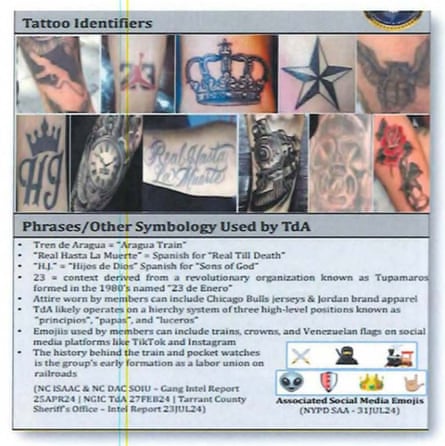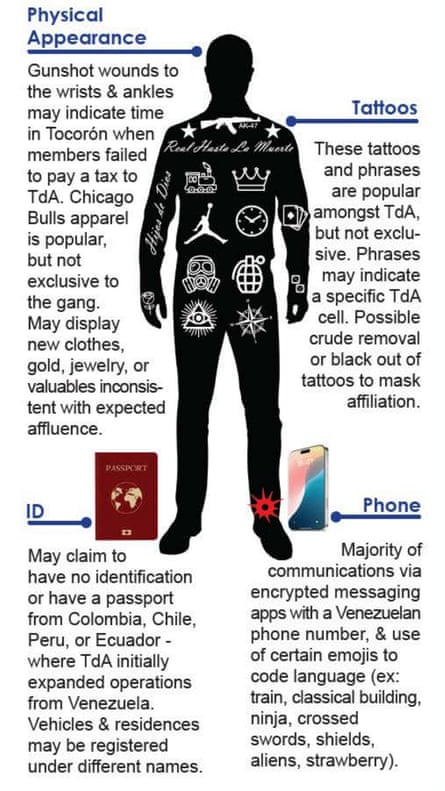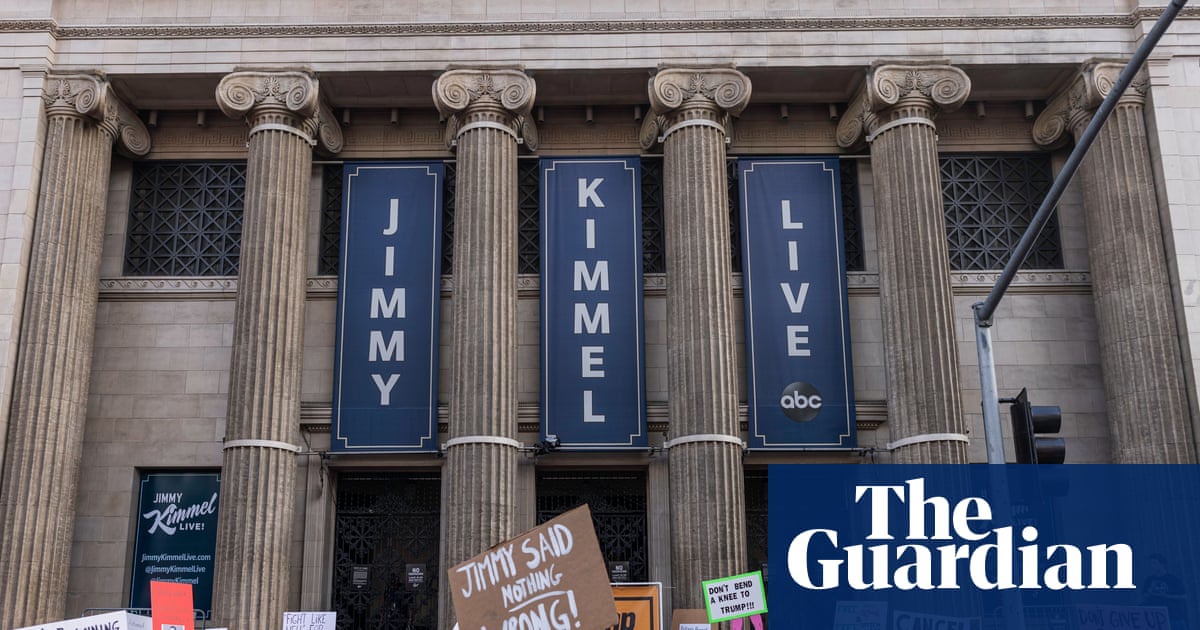US law enforcement officials have claimed that the use of certain emojis could signal affiliation with Tren de Aragua (TdA), a Venezuelan gang, according to internal records reviewed by the Guardian.
The Federal Bureau of Investigation (FBI), Customs and Border Protection (CBP), the US army and other agencies have alleged in briefings, threat warnings and training materials for law enforcement that specific symbols used on social media are associated with Tren de Aragua, a group Donald Trump has regularly cited to support his immigration crackdown.
The emoji claims, repeated by the New York police department (NYPD), were made in four reports disseminated among law enforcement in 2024 and 2025 and obtained through records requests by Property of the People, a government transparency non-profit.
Emojis that officials claimed were “commonly” used by Tren de Aragua and part of members’ “code language” include trains, swords, ninjas, aliens and strawberries.
Gang experts and immigration attorneys who reviewed the records said the claims were “ludicrous”, “uneducated” and “baseless” and raised concerns that authorities could cite emojis to erroneously label people as Tren de Aragua members – allegations that can have dire consequences, including deportation.
The emoji references echo the Trump administration’s widely scrutinized claims about tattoos: US immigration officials have suggested innocuous imagery constituted proof of Tren de Aragua membership and cited tattoos while deporting people to a notorious El Salvador prison.
Experts have said there is no evidence that Tren de Aragua, which began in the Tocorón prison in the state of Aragua, has a clearly organized structure in the US. But the Trump administration has claimed that the group poses a major threat and sought to deport alleged members under the Alien Enemies Act of 1798, a wartime law that allows for due process rights to be bypassed.
Trump has also cited the gang to justify the US military’s recent lethal strike against a Venezuelan boat in the Caribbean Sea, while Venezuela’s interior minister has said none of the 11 people killed were Tren de Aragua members. The president announced a second fatal strike on a Venezuelan boat earlier this week, but did not specify whether Tren de Aragua had been a target there.
Strawberries and hand gestures
The first reference to emojis in the records comes from a July 2024 “situational awareness” alert from the NYPD, which was distributed to law enforcement across the country and warned of Tren de Aragua threats in New York City.
NYPD’s intelligence and counter-terrorism bureau “has observed members of TdA in New York City [using] social media messaging platforms such as Instagram and TikTok to depict allegiance to the gang”, the alert said. “TdA members often utilize emojis such as trains, ninjas, slot machines, double swords, shields, ogre/mask face, and crowns.” Members also “use South American slang and Arabic language terms to mask their identities on social media”, the NYPD added.

In a section about Tren de Aragua “symbols, iconography and signs”, NYPD cited tattoos featuring Michael Jordan, guns and trains, and then printed images of seven emojis: alien face, shield, crown, hand making the rocker gesture, swords, ninja and train.
In August 2024, US army north, the domestic defense command, repeated warnings about the same seven emojis, saying the train was a reference to Tren de Aragua’s connections to a railroad union; the group’s name translates to “the train of Aragua”.
In December 2024, the FBI and the army’s National Ground Intelligence Center held a Tren de Aragua briefing in Seattle and widely shared the emoji warnings, including with officials from Washington, Oregon, Alaska, the US Bureau of Prisons, the Department of Homeland Security and the Drug Enforcement Administration, email records show.
The FBI materials described Tren de Aragua “indicators”, which it said include “gunshot wounds to the wrists and ankles” and a range of tattoos. The FBI said members communicated via encrypted messaging and used “certain emojis to code language”.
The FBI emojis list was slightly different from the one shared by the NYPD and army north and included images of a building and strawberries. It did not specify what the emojis allegedly represented. The report added: “A sole indicator does not determine TdA presence or affiliation; rather law enforcement and government officials should evaluate the totality of behavior and circumstances before assessing TdA presence or affiliation.”
In March 2025, under Trump, CBP shared the FBI’s emojis guidance in a briefing on Tren de Aragua’s “growing threat to US national security”.
An FBI spokesperson declined to comment on the records or answer questions about its TdA warnings, writing in an email: “While our standard practice is not to comment on specific products, to include the veracity of them, the FBI regularly shares information with our law enforcement partners to assist in protecting the communities they serve.”
The Department of Homeland Security (DHS) said in a statement that its “intelligence assessments go well beyond social media, tattoos, emojis, or any symbolism”.
“We are confident in our law enforcement’s intelligence, and we aren’t going to share intelligence reports and undermine national security. That would be insane,” the statement continued. Tren de Aragua commits violent crimes, and Trump designated it a foreign terrorist group “on day one”, DHS added.
A CBP spokesperson said in an email that it works with law enforcement partners to take “proactive steps to detect and positively identify members of Tren de Aragua”, adding: “Specific information used to determine membership in foreign terrorist organizations is law enforcement sensitive. CBP has comprehensive procedures using a range of criteria and methods. However, there is no single source for verification.”
A spokesperson for army north declined to comment, deferring to the NYPD, which did not respond to inquiries.
‘Unsophisticated and uneducated’
The premise that Tren de Aragua members use certain symbols, tattoos or emojis was “totally false”, said Andrés Antillano, professor of criminology at the Universidad Central de Venezuela’s Institute of Criminal Sciences.
“Tren de Aragua, especially outside of Venezuela, is not a centralized organization,” said Antillano, who said there was no evidence linking the symbols cited by the FBI to the gang: “It’s completely arbitrary. These are fashion tattoos that have nothing to do with belonging to any group. And the emojis and emoticons are also common forms of language used by young people on social networks that do not imply any membership of a criminal group.”

Tren de Aragua is not the kind of ethnic or identity-based gang that uses symbolism to indicate membership, he added. The speculation over the gang’s use of emojis and tattoos, he said, stems from a social panic that certain immigrants, especially those who are poor, are criminals: “This is an American story of stigmatization of migrants. We see the same old myths now being applied to different groups.”
Rebecca Hanson, professor at the University of Florida’s Center for Latin American Studies, has spoken to police officers in Venezuela about Tren de Aragua and summarized the conversations in court declarations in immigration cases. The officers said the idea of using tattoos to identify members was “ludicrous” and “laughable”, she said.
“What does it mean for there to be unified symbols among a group that is not itself unified?” she said, noting the decentralized nature of the group. “We have no good evidence any symbols are utilized, but even if they are on a very small scale, there is no reason to believe they’ve spread across the entire organization … So where is this information coming from? It does not seem to be informed by current practices in Venezuela or by people who have researched Venezuela.”
Hanson noted that police may review social media to make claims about people’s associations, but not to look for emojis.
Bill Hing, professor of law and migration studies at the University of San Francisco, said there was a long history of US police profiling immigrants as gang members based on dubious claims about slang and culture.
The emoji claims are “overbroad and going to lead to many false positives”, Hing said. “It’s an unsophisticated, uneducated approach that demonstrates a lack of knowledge on how things come to appear on social media.”
‘Widening the net’
While DHS has repeatedly cited tattoos in deportation proceedings of people it deemed members of Tren de Aragua, several immigration and gang experts said they were unaware of specific cases where emoji use was referenced in removals.
In May, NYPD officials and Eric Adams, the embattled New York mayor who has supported Trump’s immigration crackdown, claimed that a group of youth involved in robberies and attacks on officers were members of Tren de Aragua. At a briefing, Jason Savino, NYPD’s assistant chief of detectives, said officials had linked the teenagers to Tren de Aragua after documenting that they “use virtually the same gang signs [and] verbiage, they use the same emojis when they post on social media. They’re very, very big into posting firearms.”
Adams’s office declined to comment.
Advocates said they were concerned emoji claims could further drive unjust deportations.

“The entire TdA panic is already a smoke and mirrors affair to disguise the Trump regime’s nativism and cruelty as a national security imperative,” said Ryan Shapiro, executive director of Property of the People, in a statement. “And emoji use is an even more absurd subterfuge than supposed TdA tattoos.”
In immigration cases, attorneys often see a “circular reinforcement” of gang claims, where a flimsy piece of evidence is repeated by multiple law enforcement agencies, said Sirine Shebaya, executive director of the National Immigration Project, a legal advocacy group. She has represented Venezuelan clients whom she argued were falsely accused of Tren de Aragua affiliation.
Shebaya said she was not aware of any cases of emojis cited in immigration proceedings, but said the claims in the records “seem made up out of whole cloth”: “There’s a feedback loop between different law enforcement agencies that starts with something completely baseless but takes on a life of its own in a way that really impacts people’s lives.”
Hanson said she was particularly concerned about the treatment of Venezuelans after the US supreme court last week sided with federal immigration officials in a major racial-profiling case, ruling agents can stop people in Los Angeles simply for speaking Spanish or looking Latino.
If the US started citing emojis in the same way that immigration authorities have referenced tattoos, “it’s just going to widen the net of the people they capture”, Hanson said. “It’s incredibly alarming.”
DHS officials claimed they don’t only rely on tattoos to allege Tren de Aragua affiliation, but lawyers for deported Venezuelans have said tattoos were the sole or central evidence.
CJ Sandley, senior staff attorney at the Center for Constitutional Rights, a non-profit that represented a Venezuelan man deported to El Salvador, said US immigration officials had searched their client’s phone, but did not cite emoji use. One piece of evidence officials cited to allege Tren de Aragua affiliation was a random photo of cash that he had downloaded, but not taken himself, Sandley said. An immigration judge did not agree with the government’s assertions that he was a Tren de Aragua member who posed a danger.
“It strikes me as assuming that things that are in a subset of popular culture are indicia of gang affiliation and international organized crime, which is what our government is alleging Tren de Aragua is,” Sandley said, of the emoji claims. “Just like the tattoos, we could see folks rounded up, detained and possibly sent to places where they are tortured based solely on their use of certain emojis. It is absurd and so dangerous.”

 German (DE)
German (DE)  English (US)
English (US)  Spanish (ES)
Spanish (ES)  French (FR)
French (FR)  Hindi (IN)
Hindi (IN)  Italian (IT)
Italian (IT)  Russian (RU)
Russian (RU)  2 hours ago
2 hours ago
























Comments